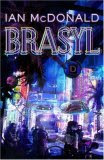Author James Lovegrove reviews several science fiction novels, including Ian McDonald’s forthcoming Brasyl, in a February 10th article in the Financial Times entitled “They Walk Among Us.”
Lovegrove says, “Contrary to received opinion, science fiction’s preoccupation .jpg) has always been the here and now. Its far-flung planets and future timelines are merely a way to analyse the contemporary. In this respect, it is the most politically engaged of all literary genres. Motifs that may appear trashy to the uninitiated – space exploration, extraterrestrials, futuristic technology – can in fact be surprisingly sophisticated tools for dissecting and examining the world as it is.”
has always been the here and now. Its far-flung planets and future timelines are merely a way to analyse the contemporary. In this respect, it is the most politically engaged of all literary genres. Motifs that may appear trashy to the uninitiated – space exploration, extraterrestrials, futuristic technology – can in fact be surprisingly sophisticated tools for dissecting and examining the world as it is.”
He then goes on to note, as others have done, a recent trend emerging in modern science fiction, an alteration in the way SF realizes “the urge to address state-of-the-world concerns.” As Lovegrove says, “The emptiness of space, coupled with the fragility of our increasingly fevered home planet, has led these writers to aim their telescopes directly at life on Earth. The genre is still intrigued by notions of otherness. This manifests now, though, not through tales of bug-eyed monsters from beyond, but by measured scrutiny of ‘aliens’ closer to home. Science fiction is written predominantly by white, western males. For them, the alien may be found beyond borders, across continents. The Other is someone with a different language, skin colour, even gender.”
Lovegrove then discusses Geoff Ryman’s Air, Ken MacLeod’s The Execution Channel, Richard Morgan’s Black Man (published in the US as “Thirteen”), and finally McDonald’s work, of which he says it’s literary structure is: “an immense, marvellous beast whose shape comes slowly, majestically into focus, constructed out of a welter of thematic elements such as quantum computing, multiverse theory, and the clash between science and religion.”
All in all, a very interesting article about the new globally-focused, non-US-centric science fiction.